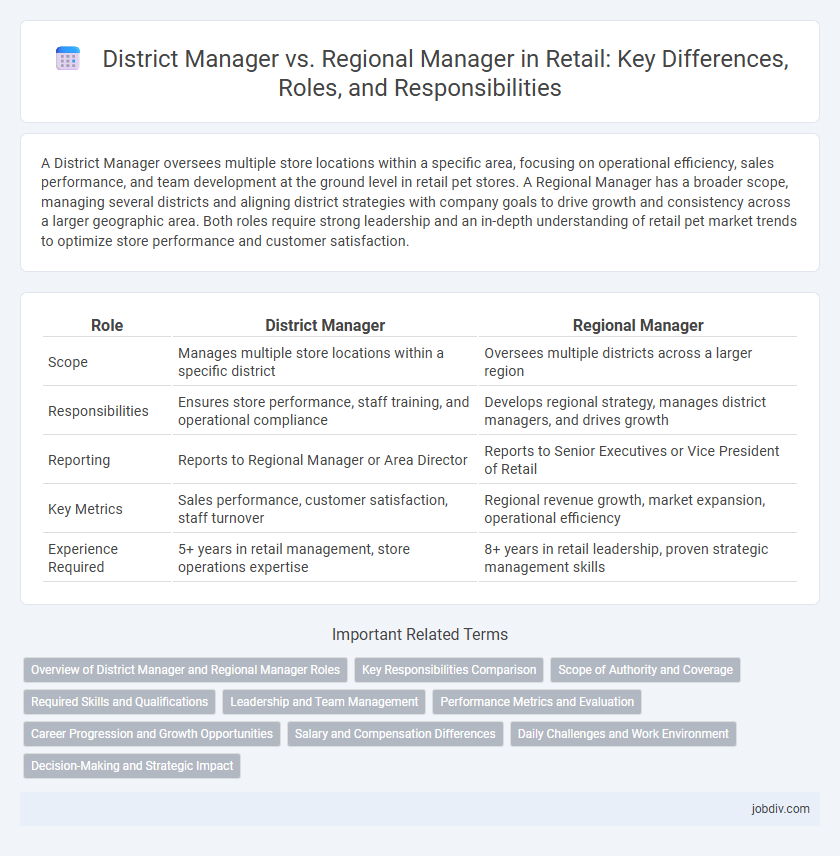A District Manager oversees multiple store locations within a specific area, focusing on operational efficiency, sales performance, and team development at the ground level in retail pet stores. A Regional Manager has a broader scope, managing several districts and aligning district strategies with company goals to drive growth and consistency across a larger geographic area. Both roles require strong leadership and an in-depth understanding of retail pet market trends to optimize store performance and customer satisfaction.
Table of Comparison
| Role | District Manager | Regional Manager |
|---|---|---|
| Scope | Manages multiple store locations within a specific district | Oversees multiple districts across a larger region |
| Responsibilities | Ensures store performance, staff training, and operational compliance | Develops regional strategy, manages district managers, and drives growth |
| Reporting | Reports to Regional Manager or Area Director | Reports to Senior Executives or Vice President of Retail |
| Key Metrics | Sales performance, customer satisfaction, staff turnover | Regional revenue growth, market expansion, operational efficiency |
| Experience Required | 5+ years in retail management, store operations expertise | 8+ years in retail leadership, proven strategic management skills |
Overview of District Manager and Regional Manager Roles
District Managers oversee multiple store locations within a specific area, focusing on operational efficiency, staff performance, and sales targets to ensure consistent customer experiences. Regional Managers have broader responsibilities, managing multiple districts across a larger geographic region while developing strategic plans and aligning district goals with corporate objectives. Both roles require strong leadership, analytical skills, and the ability to drive growth through effective team management and resource allocation.
Key Responsibilities Comparison
District Managers oversee multiple store locations within a specific district, focusing on operational efficiency, sales performance, and team leadership at the store level. Regional Managers have broader responsibilities, including strategic planning, budget management, and coordination across multiple districts to drive overall regional growth. Both roles emphasize staff development and customer satisfaction, but Regional Managers prioritize aligning district goals with corporate objectives.
Scope of Authority and Coverage
A District Manager oversees multiple store locations within a specific district, focusing on daily operations, staff management, and achieving sales targets within that confined area. In contrast, a Regional Manager holds broader authority, supervising several district managers across a larger geographic region and strategizing long-term growth and market expansion. The Regional Manager's scope includes higher-level decision-making, budget allocation, and cross-district coordination, making their coverage significantly wider and more complex than that of a District Manager.
Required Skills and Qualifications
District Managers in retail require strong leadership skills, expertise in team management, and proficiency in sales analysis to oversee multiple store locations effectively. Regional Managers demand advanced strategic planning abilities, experience in large-scale operational oversight, and exceptional communication skills to coordinate broader market regions and drive overall business growth. Both roles prioritize qualifications such as a bachelor's degree in business or related fields and substantial retail management experience.
Leadership and Team Management
District Managers directly oversee multiple store managers, ensuring consistent operational standards and driving sales performance within their district, while Regional Managers hold broader responsibility over several districts, focusing on strategic leadership and cross-district collaboration. Leadership at the district level emphasizes hands-on team management, coaching individual store managers to meet targets and enhance customer experience. Regional Managers prioritize high-level team alignment, resource allocation, and regional growth strategies to achieve long-term business objectives.
Performance Metrics and Evaluation
District Managers oversee multiple store locations within a specific district, focusing on sales targets, inventory turnover, and employee productivity to drive store-level performance. Regional Managers evaluate broader performance metrics, such as overall revenue growth, market share expansion, and operational efficiency across multiple districts, ensuring strategic alignment with corporate goals. Both roles utilize key performance indicators (KPIs) like same-store sales, customer satisfaction scores, and labor cost ratios to assess and optimize retail operations.
Career Progression and Growth Opportunities
District Managers oversee multiple store operations within a specific area, focusing on sales performance, staff management, and customer satisfaction to ensure consistent execution of company strategies. Regional Managers typically handle a broader geographic region, supervising several District Managers, driving strategic initiatives, and managing higher-level budgets and goals that impact overall market growth. Career progression from District Manager to Regional Manager involves developing advanced leadership skills, strategic planning capabilities, and a proven track record of improving sales metrics and operational efficiency across multiple districts.
Salary and Compensation Differences
District Managers typically earn an average salary ranging from $65,000 to $85,000 annually, reflecting their responsibility for overseeing multiple store locations within a specific district. Regional Managers command higher compensation, often between $90,000 and $130,000 per year, due to their broader oversight of multiple districts and strategic role in regional operations. Bonuses and profit-sharing opportunities are more substantial for Regional Managers, aligning with their increased accountability and impact on overall company performance.
Daily Challenges and Work Environment
District Managers in retail face daily challenges such as managing store performance across multiple locations, resolving employee conflicts, and ensuring consistent customer service standards. Regional Managers oversee broader territories, balancing strategic initiatives with operational demands while managing multiple district managers and prioritizing market trends. Both roles require adaptability in dynamic retail environments, with District Managers focusing more on hands-on store-level issues and Regional Managers handling high-level coordination and long-term planning.
Decision-Making and Strategic Impact
District Managers oversee multiple store locations within a specific geographic area, focusing on tactical decision-making such as daily operations, staff performance, and local sales initiatives. Regional Managers operate at a higher level, shaping long-term strategic goals across several districts and aligning business objectives with broader market trends and company growth plans. The strategic impact of Regional Managers includes resource allocation and cross-district coordination, while District Managers emphasize immediate operational efficiency and customer experience improvements.
District Manager vs Regional Manager Infographic

 jobdiv.com
jobdiv.com